外研版英语八年级下册Module2语法全解:现在完成时用法解析
外研版八年级下册M2语法
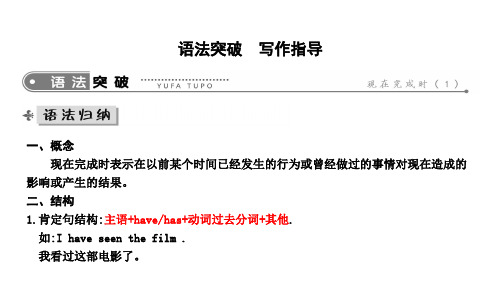
My sister has
worked in the company for two years.
20.We have planted lots of trees since we came here.(对画线部分提问)
How
long have you planted lots of trees?
Ⅱ.单项选择
C.never;never D.never;ever
the ways of doing
( B )8.—Have you found your bike?
—
.
A.No,you have B.Not yet
C.Yes,I do
D.Yes,I found
( D )9.Since we began to use the Internet,our lives
go—went—gone
Ⅰ.写出下列动词的过去式和过去分词
1.eat→ ate →
eaten
2.try→ tried → tried
3.make → made → made 4.put→ put → put
5.do →__d_i_d_____ →d_o_n_e___
Ⅱ.单项选择
( D )6.In the past few years,many schools
( D )6.In the past few years,many schools
morning exercises.
A.change B.changes
C.will change ( A )7.—Have you
D.have changed eaten Beijing duck?
—No,
.
Module 2课文知识点总结(含语法)-外研版八年级下册英语

2021~2022学年新课标外研版初中英语学习讲义八年级下学期Module 2课文知识点总结笔记Module 2 Experiences语法: 现在完成时(一)一、用法:(1)表示以前某个时间已经发生的动作或做过的事情对现在有影响 Eg: I have seen the film. 我已经看过这部电影了。
(强调电影的内容已经知道)(2)表示到目前为止已经完成的事。
Eg: My sister has learnt English for 3 years. 我的妹妹已经学英语三年了。
二、构成:主语 + have/ has + 动词过去分词三、各种句式肯定句:主语 + have/ has + 过去分词 + 其它Eg: I have watched the match.否定句:主语 + have/ has not + 过去分词 + 其它Eg: I haven’t watched the match.一般疑问句:Have/ Has + 主语 + 过去分词 + 其它肯定回答: Yes, 主语 + have/ has.否定回答: No, 主语 + haven’t/ hasn’t.Eg: Have you watched the match ?Yes, I have./ No, I haven’t.四、动词过去分词的构成:规则动词变化1.大多数动词后直接加ed:work → worked; cook → cooked2.以e结尾的动词加d:lived → lived; like→ liked3.以辅音加y结尾将y变成i加ed:try → tried; study → studied4.在重读闭音节中,双写结尾加ed: stop → stopped; plan → planned5.不规则变化:见教材126页表格1.experience ( Cn.) 经历Eg: Please tell me about your experience in Africa.experience (Un) 经验Eg: Miss Li has 30 years’ teaching exper ience.2.enter a competition 参加比赛enter = take part in 参加;进入3.what kind of …什么种类kind (n.) 种类 all kinds of 各种各样的; a kind of 一种; different kinds of 不同种类的;kind of 有点;kind (adj.) 善良的 Eg: He is a kind boy.4.speaking competition 演讲比赛5.improve speaking 提高口语6.maybe (adv.) “也许;大概”may be 情态动词 + Be动词“也许是;可能是”Eg: She may be angry.= Maybe she is angry.7.win a prize 获奖beat “打败”后接对手或团队等win “赢得”后接比赛、奖品等8.the first prize 一等奖9.dream (n.) 梦寐以求的人或事Eg: That’s my dream s chool.dream “梦;梦想”Eg: My dream is to be a pilot.(v.) 梦到;梦想dream of/ about …“梦见… ”后接名词、代词或动名词Eg: I dream of/ about flying in space.10.ever (adv.) “曾经;从未”用于现在完成时的一般疑问句中,加强语气“Have/ Has sb. ever + 过去分词 + 其它?”用于询问某人是否做过某事11.before(adv.) “以前”与现在完成时连用,也可用于一般过去时中,位于句末。
最新外研版八年级英语(下)现在完成时的用法

最新外研版八年级英语(下)现在完成时的用法一、表示过去发生并且已经完成的动作对现在造成的影响或结果。
例如:你读过那个故事吗?Haveyoureadthattory(―读‖这一动作发生在过去,对现在造成的影响为:是否知道故事中的内容)我买了两个苹果。
Ihaveboughttwoapple.(―买‖这一动作发生在过去对现在造成的结果是:拥有两个苹果)(一)、构成:“助动词have/ha+动词的过去分词”(二)、句型结构:肯定式:主语+have/ha+过去分词+其它。
一般疑问句:Have/ha+主语+过去分词+其它如:HaJackfinihedhihomework回答:肯定:Ye,主语+have/ha.否定:No,主语+haven’t/han’t.特殊疑问句:特殊疑问词+一般疑问句?如:Howlonghaveyouhadthedog[当堂检测]完成下列句子:1.李明还没看过这本书了。
Liming____________thatbook______.2.他去看医生了吗?______he____________eethedoctor3.我非常高兴,因为我通过这次英语考试。
Iamveryhappy,becaueI____________theEnglihe某am.4.你在这等了多久了__________________you_____here5.妈妈把那本书弄丢了。
Mum__________thatbook.6.你去哪了?Where_____you_____(三)、常与现在完成时态连用的几个副词:already,jut多用于肯定句中,yet,ever,never多用于疑问句和否定句中。
如:1、Ihavealreadyfinihedmyhomework.我已经做完家庭作业。
2、hehajuthadupper.她刚吃过晚饭。
3、HaveyoueverungthiEnglihong你曾唱过这首英文歌吗?4、Theyhaven'tdonethehomeworkyet.他们还没有做作业。
Module2知识点详解-挖空-2022-2023学年人外研版八年级英语下册
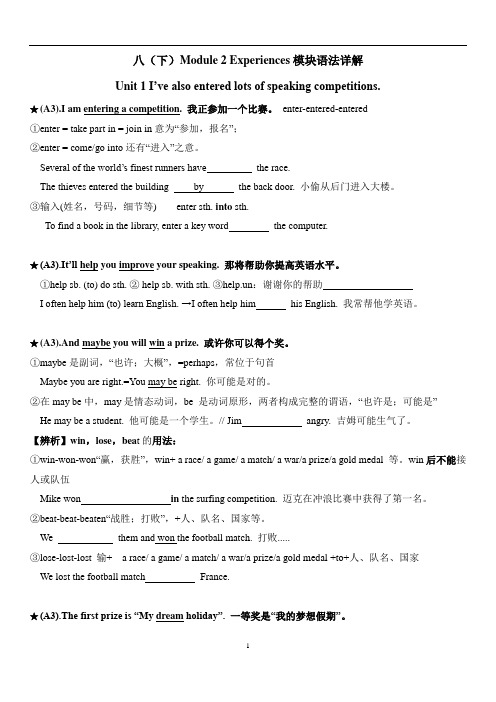
八(下)Module 2 Experiences模块语法详解Unit 1 I’ve also entered lots of speaking competitions.★(A3).I am entering a competition. 我正参加一个比赛。
enter-entered-entered①enter = take part in = join in意为“参加,报名”;②enter = come/go into还有“进入”之意。
Several of the world’s finest runners have the race.The thieves entered the building by the back door. 小偷从后门进入大楼。
③输入(姓名,号码,细节等) enter sth. into sth.To find a book in the library, enter a key word the computer.★(A3).It’ll help you improve your speaking. 那将帮助你提高英语水平。
①help sb. (to) do sth. ② help sb. with sth. ③help.un:谢谢你的帮助I often help him (to) learn English. →I often h elp him his English. 我常帮他学英语。
★(A3).And maybe you will win a prize. 或许你可以得个奖。
①maybe是副词,“也许;大概”,=perhaps,常位于句首Maybe you are right.=You may be right. 你可能是对的。
②在may be中,may是情态动词,be 是动词原形,两者构成完整的谓语,“也许是;可能是”He may be a student. 他可能是一个学生。
Module 2 语法详解和训练-外研版八年级下册英语

外研版英语八(下)Module 2 Experiences模块语法详解现在完成时(1)一、现在完成时的用法1. 表示过去某时发生的动作或存在的状态,对现在产生影响或结果。
常和already, yet, just, ever, never, before等副词连用。
如:Jim has laid the table. 吉姆已经摆好桌子了。
(含义是:现在桌子已经摆好了。
)I have spent all of my money. 我花完了我所有的钱。
(含义是:现在我没有钱花了。
)2. 表示到目前为止经历过或未经历过的事。
如:I have never been to England. 我从没有去过英国。
二、现在完成时谓语部分的构成由“助动词have/has + 过去分词”构成。
在人称代词后have, has可以缩写为’ve或’s,。
三、现在完成各种句式变化:1. 肯定式:主语+助动词have (has)+过去分词+其他。
如:He’s eaten breakfast. 他吃过早饭了。
2. 否定式:主语+助动词have (has)+not+过去分词+其他。
have/has not 缩写haven’t/hasn’t。
如:He hasn’t eaten breakfast. 他没吃早饭。
3. 疑问式:助动词have (has)+主语+过去分词+其他?如:Has he eaten breakfast? 他吃过早饭了吗?4. 特殊疑问句:特殊疑问词+have/has+主语+动词的过去分词+其他?如:How long have you lived here? 你住在这儿多久啦?四、动词过去式、过去分词的规则变化1. 一般情况下,在动词后加-ed。
如:work→work ed→work ed; finish→finish ed→finish ed; play→played→played; rain→rained→rained2. 在以e结尾的动词后加-d。
八年级外研版下册英语+模块语法聚焦二

[答案] 5.B 6.D
模块语法聚焦二
Ⅱ.用所给词的适当形式填空 1.Mum, can I watch TV nowh?aveI f_i_n_is_h_e_d_____ (finish) my homework. 2.The boyhsav_e_n_'_t_r_e_a_d___ (not read) the interestihanvge books yheeatr.d Their mother will buy some for them. 3.—______ you g_o_t_____ (hear) from your pen pal recently? —Yes,HaIvehave. I ____e_a_ten(get) a letter from him yesterday.
模块语法聚焦二
实战演练
Ⅰ.单项填空
( )1.[2014•赤峰]—The storybook is very
interesting.
—I agree with you. I________ it twice already.
A.read
B.will read
C.am reading D.have read
模块语法聚焦二
5—.Ye—sH_,a_v_Ie_h__a_sy_o_u_ca.l_l_e_d____(call) your mum yet? I6._c_—al__lh__ead__s_____(Jcaaclvkli)s_i_htee_rd_l_a_s(tvinsiigth)t.his
grandpareHnatves?
3.现在完成时的否定形式ha为ve_n_'_t_/_h_a_s_n_'_t_+__动__词__的__过__去__分_,词 其一般疑问句形式是把h_a_v_e_/_h_a_s_ 提到句首,动词过去分词不 变化。
2017八年级下册外研版英语Module2 现在完成时

现在完成时态 ( present perfect tense)
不同的时间要使用不同的动词时态
past
present(now)
future
I am visiting the Great Wall now.
visit
I will visit the Great Wall tomorrow. I visited the Great Wall yesterday.
过去分词的构成分为 规则变化和不规则变化两种:
规则变化:
a) 一般情况下,在动词后直接加ed, 如
play---played, water---watered, work---worked, finish---finished等; visit--- visited
b) 以“辅音字母+ y”结尾的动词, 把y 变成i 再加ed, carry---carried study---studied等;
(一)ABC 型:
be(am,is,are) was / were
been
begin
bite break choose do
began
bit broke chose did
begun
bitten / bit broken chosen done
(二) ABB型:
bring brought brought
Mother: John, clean your teeth, please. John: Mum, I have cleaned them.
study for English test ----- have studied for it tell me the truth ----- have told you everything
Module 2-Module 3 现在完成时语法 外研版八年级英语下册
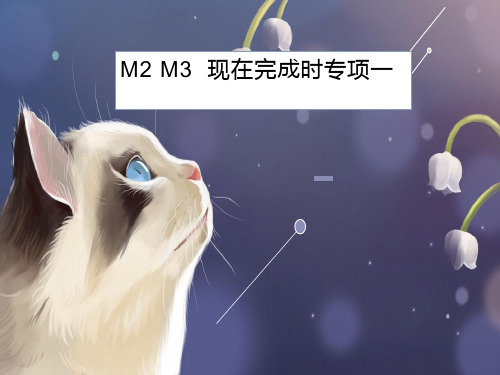
Exercises
一、单项选择。
1. He _____A____ taught here for 5 years.
A. has
B. have
C. was
2. have visited Qingdao ___B____.
A. two months ago B. before C. now
4. Betty has _B___ entered a competition, so she wants
_a_t _o_th_e_r__p_la_n_e_t_s_?________
4.I’ve saw a great TV programme about space.
否定句:__I_h__a_v_e_n_’_t_s_a_w___a_g_r_e_a__t _T_V________ —p—ro—gr—a—m—me—a—bo—u—t s—pa—ce—. ———
3.疑问句及回答:(提前has\have) Have/Has +主语+done? 肯 否在用定定变问::一 号NY般 ;eos疑 同,,问 时主主句 把语语时句++:中hha的把avvehse/oa/hmhvaaeses或变+. hnaaonsty放., a到lre句ad首y变, 句ye末t。
—Have you worked? —肯Y定e回s, 答I h用av“e.Y\esN, o主, 语I h+avhaevneo/th/haas.v”e;n’t.
M2 M3 现在完成时专项一
现在完成时定义 •1. M2重点
(1)表示过去的一个动作对现在造成的影响.
I have seen the film. (对电影内容熟悉)
(2)表示到目前为止动作已经完成了。
外研版八年级英语下册Module2Experiences语法辅导

第2模块知识辅导语法:现在完成时(I)1 定义表示过去发生的动作对现在造成的影响和结果,即用一个过去的动作来说明现在的情况我已经读了这本书不想再I have read the book. I don’t want to read it again.读了。
(对现在的影响)He has finished the work.他已完成了那项工作。
(表结果)I've known him since then.我从那时起就认识他了。
(表经历)2 构成助动词have/has + done 现在完成时属于现在时态范畴3.现在完成时的各种句型:①.肯定句助动词have/has + doneGrandma has sent me a parcel. 奶奶给我寄了一个邮包。
②.否定句在have/has 后直接加not,可以缩写成haven’t , hasn’t .我还没有吃那块巧克力。
I haven’t eaten the chocolate.③.一般疑问句把肯定句的have/has 放到句子前面。
如:Have you tidied the table? 你们收拾餐桌了吗?肯定回答:Yes, I have.否定回答:No, I haven’t.再如:Has she washed her dress? 她洗过她的衣服了吗?肯定回答:Yes, she has. 否定回答:No, she hasn’t.④.特殊疑问句特殊疑问词+have/has+主语+动词的过去分词+其他如How many books have you read? 你读过多少本书?What has Tom done to the bird? 汤姆对那只小鸟做了什么?Where have you been? 你去哪里了?Who has seen the wind? 谁见过风?4.过去分词是非谓语动词的一种形式,是规则动词的过去分词变化规律:①.原形+ed,如:work—worked—worked; visit—visited—visited②.字尾为e时,只需加-d,如:like—liked—liked; live—lived—lived③.字尾为“元音字母+y”,保留y,直接加ed。
八下module2 现在完成时
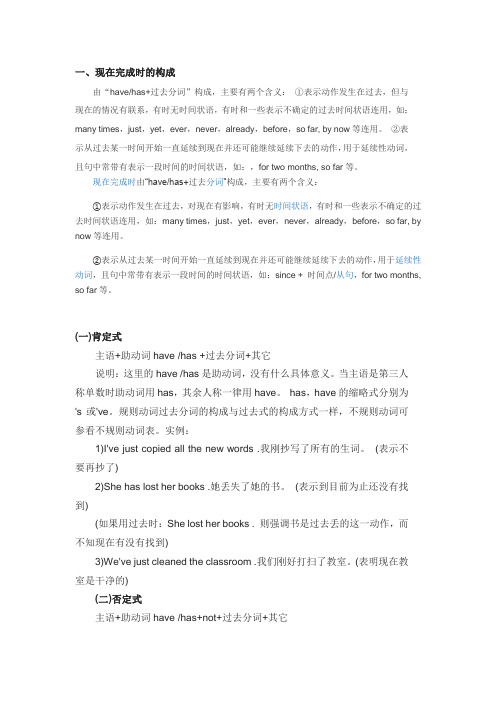
一、现在完成时的构成由“have/has+过去分词”构成,主要有两个含义:①表示动作发生在过去,但与现在的情况有联系,有时无时间状语,有时和一些表示不确定的过去时间状语连用,如:many times,just,yet,ever,never,already,before,so far, by now等连用。
②表示从过去某一时间开始一直延续到现在并还可能继续延续下去的动作,用于延续性动词,且句中常带有表示一段时间的时间状语,如:,for two months, so far等。
现在完成时由“have/has+过去分词”构成,主要有两个含义:①表示动作发生在过去,对现在有影响,有时无时间状语,有时和一些表示不确定的过去时间状语连用,如:many times,just,yet,ever,never,already,before,so far, by now等连用。
②表示从过去某一时间开始一直延续到现在并还可能继续延续下去的动作,用于延续性动词,且句中常带有表示一段时间的时间状语,如:since + 时间点/从句,for two months, so far等。
(一)肯定式主语+助动词have /has +过去分词+其它说明:这里的have /has是助动词,没有什么具体意义。
当主语是第三人称单数时助动词用has,其余人称一律用have。
has,have的缩略式分别为's或've。
规则动词过去分词的构成与过去式的构成方式一样,不规则动词可参看不规则动词表。
实例:1)I've just copied all the new words .我刚抄写了所有的生词。
(表示不要再抄了)2)She has lost her books .她丢失了她的书。
(表示到目前为止还没有找到)(如果用过去时:She lost her books . 则强调书是过去丢的这一动作,而不知现在有没有找到)3)We've just cleaned the classroom .我们刚好打扫了教室。
最新外研版英语八年级下册Module 2知识点总结
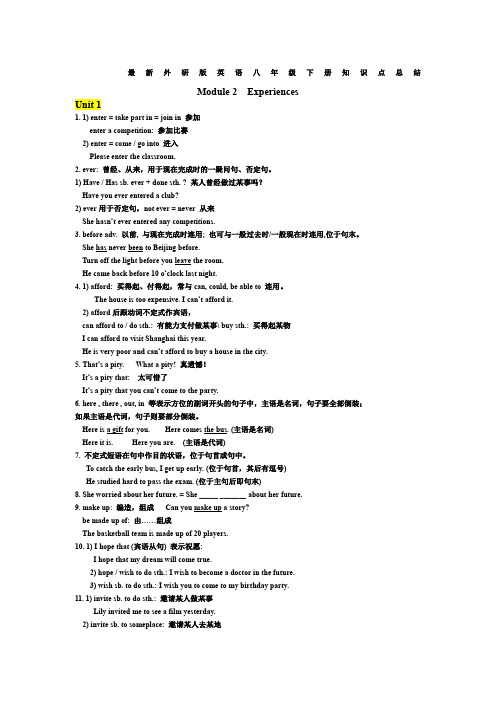
最新外研版英语八年级下册知识点总结Module 2 ExperiencesUnit 11. 1) enter = take part in = join in 参加enter a competition: 参加比赛2) enter = come / go into 进入Please enter the classroom.2. ever: 曾经、从来,用于现在完成时的一疑问句、否定句。
1) Have / Has sb. ever + done sth. ? 某人曾经做过某事吗?Have you ever entered a club?2) ever用于否定句,not ever = never 从来She hasn’t ever entered any competitions.3. before adv. 以前, 与现在完成时连用; 也可与一般过去时/一般现在时连用,位于句末。
She has never been to Beijing before.Turn off the light before you leave the room.He came back before 10 o’clock last night.4. 1) afford: 买得起、付得起,常与can, could, be able to 连用。
The house is too expensive. I can’t afford it.2) afford后跟动词不定式作宾语,can afford to / do sth.: 有能力支付做某事\ buy sth.: 买得起某物I can afford to visit Shanghai this year.He is very poor and can’t afford to buy a house in the city.5. That’s a pity. What a pity! 真遗憾!It’s a pity that: 太可惜了It’s a pity that you can’t come to the party.6. here , there , out, in 等表示方位的副词开头的句子中,主语是名词,句子要全部倒装;如果主语是代词,句子则要部分倒装。
外研版英语 八年级下册 Module2 现在完成时
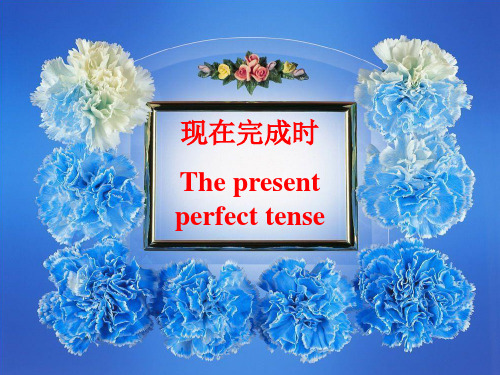
16
1. You’ve never heard ___ this new kind of plane, __ you?
Hale Waihona Puke A. / ; haven’t B. of ; haven’t C. of ; do D. of ; have
2. ---I have ______ here for two months.
---So you ______ here since two months ago.
A. come, came B. been, have been
C. been, come D. come, have been
3. He was _______ teaching _______ English.
A.sell out B.been sold out C.sold out D.sold
4.—I have been to France twice.
—Wonderful!When ________you________there?
A. have;been B. did;went C. have;gone D. did;go
in the last+段时间(最近的…)
till/until(直到)
up to now(至今)
改错
1. I has read the book. 2. He have gone to the library. 3. Have you saw the film? 4. He’s just washed his clothes, isn’t he? 5. She has finished her job last week. 6. Have you done your homework already?
外研新版八年级下MODULE2 UNIT1

3.学生们刚刚(just)把书看了(read)好几次了。 have The students_____just _____the read books several times.
read The students_______just_____the haven’t books several times.
13
6.This is the best film I have_______seen before.
A.never
B.ever
C.once
D.always
7.Why don’t you go to the movie with me,Betty? Because I_______it before. A.saw B.have seen C.see D.has seen 8.Mike,why are you watching TV again?
Have read ____the students just _____the books several times? have haven’t Yes,they________. No,they________.
Quiz
Ⅰ. 用所给动词Байду номын сангаас适当形式填空。 去了,人已经回来了 have been(be) to Shanghai twice. 1. They _________
So far,they have already learnt to speak Arabic.
1.现在完成时的定义: 1)可以表示过去发生的事或已经完成的动作对现在造成 的影响或产生的结果 2)还可以表示到现在为止经历过或没经历过的事。
2017八年级下册外研版英语Module2 现在完成时

练习3:现在完成时疑问句及否定句 visited Beijing ? travelled by plane? A: Have you ever played football? entered a competition?
B: Yes, I have. I have visited Beijing. No, I haven’t. I haven’t visited Beijing. A: Has she/he visited/played/… C: Yes, she/he has. She/He has visited/… No, she/he hasn’t. She /He hasn’t visited…
动词过去分词done的变化规则 2. 不规则动词的过去分词形式需要特殊记忆。 如: am/is --- was/ were --- been drink--- drank--- drunk 详见课本P126---P129
不规则动词表
Infinitive(原形) Past Tense(过去式) Past Participle(过去分词)
John: Oh, she has just bought some.
make some coffee ---- has made some call Mr. Smith ---- has called him
dry her hair ---- has dried
hers
Practice
hotels haven’t _______ entered any _________ 1、I ________ . 我没有进过任何的酒店。 at the hasn’t looked 2、He _______ ______ ______ blackboard today . 他今天上课没看过黑板。 have _____ never ______the visited 3、They _____ city . 她们从来没来过城市旅游。
- 1、下载文档前请自行甄别文档内容的完整性,平台不提供额外的编辑、内容补充、找答案等附加服务。
- 2、"仅部分预览"的文档,不可在线预览部分如存在完整性等问题,可反馈申请退款(可完整预览的文档不适用该条件!)。
- 3、如文档侵犯您的权益,请联系客服反馈,我们会尽快为您处理(人工客服工作时间:9:00-18:30)。
语法全解:现在完成时用法解析
1.构成
现在完成时是由助动词have(has)+动词的过去分词构成。
助动词说明该谓语是属于现在时范围。
它和主语的人称、数要保持一致。
过去分词是主要的谓语动词,说明句子的意义。
2.用法
(1)表示动作发生在过去某个不确定的时间,但对现在留下了某种影响和结果。
常被just、already、yet 等副词修饰。
如:
-Have you had lunch yet? -Yes, I have. I've just had it.
你(已经)吃午饭了吗?我刚刚吃过。
(现在我不饿了)
(2)表示从过去某一时刻开始一直持续到现在的动作或状态。
这个动作可能刚停止,可能仍然在进行。
常带有for和since等表示一段时间的状语如:
He has taught here since 1981 他自1981年就在这儿教书。
(可能还要继续教)
I haven’t seen he r for four years.
我有四年没见到她了。
(3)表示说话前发生过一次或多次的动作,现在成为一种经验,一般译为汉语“过”,常带有twice, ever, never, three times等时间状语。
如:
I have been to Beijing twice.我去过北京二次。
3.现在完成时的时间状语
(1)现在完成时属于现在时范围,故不能和过去的时间状语连用。
如:yesterday, last Sunday,in1990,three years ago等。
但是,在强调动作产生的后果和影响时,可以和一些表示不确定的时间状语连用。
a. 用副词already和yet。
already一般用于肯定句中,yet一般用于否定句和疑问句中。
如:
We have already finished our homework.我们已完成作业了。
They haven't finished their homework yet.他们还没有完成作业。
b.用ever 和never。
多用于否定或疑问句中,表示“曾经”或“从未“等。
如:-Have you ever been to the Great Wall? 你曾经去过长城吗?
-I have never been to the Great Wall.我从未去过长城。
c.用表示到说话为止的过去时间状语,如just, before, up to now, the past few years 等。
例如:
I have seen her before, but I cannot remember where.
我以前见过她,但记不起在哪里见过。
He has been there three times the last few days.
近几年他去过那里三次了。
d.用包括“现在”在内的时间状语,如:now, today, this morning(month, year, term)等。
例如:
-Have you met him today?
-No, I haven't.
今天你见过他吗?我没有。
How many times have you been there this year?
今年你去过那里多少次?
2)现在完成时可以和带有since或for等表示“一段时间”的状语连用,表示动作或状态从某一时刻开始,一直持续到现在。
如:I haven't seen him for two years. 但是,像come, arrive, buy等终止性动词不能与表示“一段时间”的状语连用。
要用,必须改为“be(在)”等延续性动词来表述。
现归纳总结一下由非延续性动词到延续性动词的转换:
arrive →be here be gin(start)→be on
die →be dead come back →be back
leave →be away fall ill(sick, asleep)→be ill(sick, asleep)
get up →be up go out →be out
finish →be ov er put on →wear 或be on
open →be ope n join →be in或be a member of…
close →be closed go to school →be a stu dent
borrow →keep buy →have
catch(a cold)→ have(a cold)get to know →know
begin to study →study come to work →work等
如:He has been a soldier for three years.他参军三年了。
